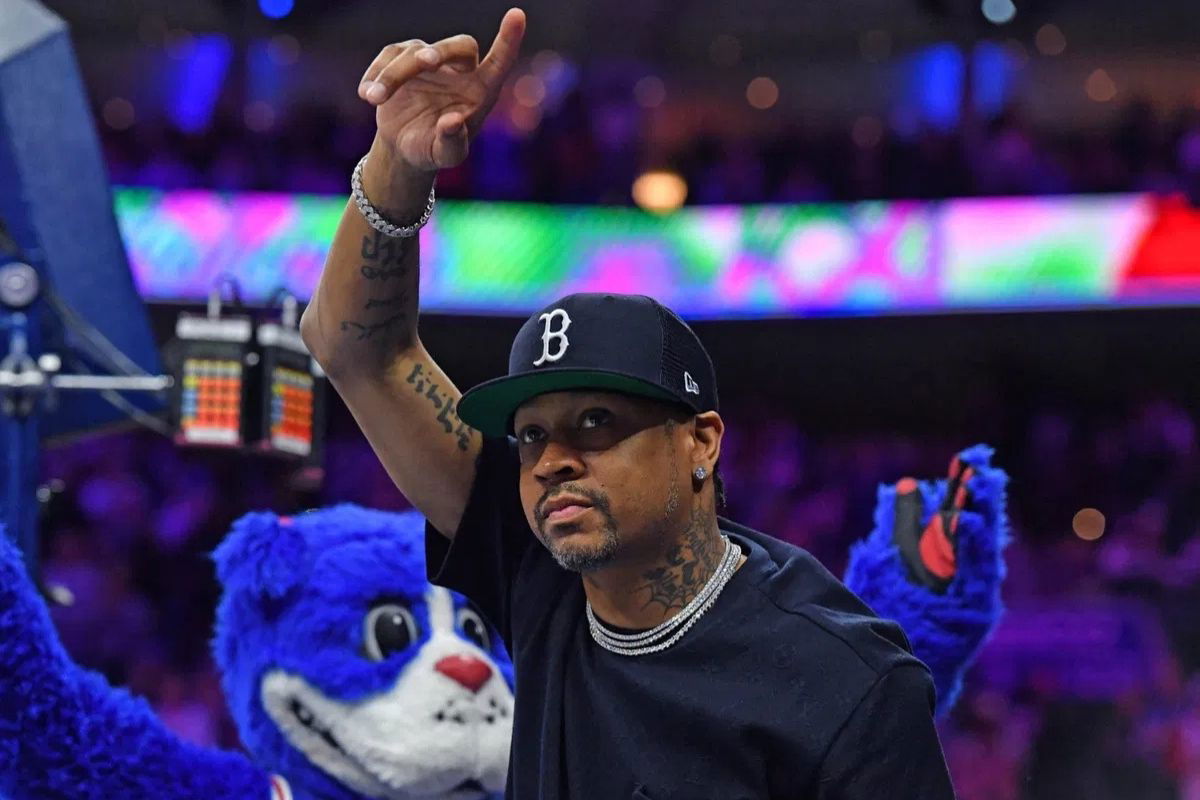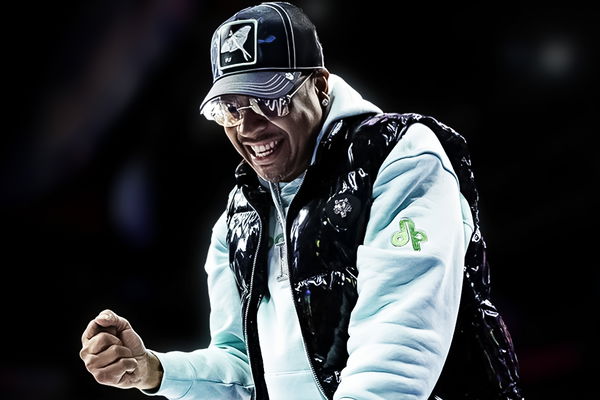
USA Today via Reuters
Mar 10, 2022; Philadelphia, Pennsylvania, USA; Former Philadelphia 76ers player Allen Iverson acknowledges the crowd during the game against the Brooklyn Nets during the second quarter at Wells Fargo Center. Mandatory Credit: Eric Hartline-USA TODAY Sports

USA Today via Reuters
Mar 10, 2022; Philadelphia, Pennsylvania, USA; Former Philadelphia 76ers player Allen Iverson acknowledges the crowd during the game against the Brooklyn Nets during the second quarter at Wells Fargo Center. Mandatory Credit: Eric Hartline-USA TODAY Sports
What if the NBA never had Allen Iverson? No cornrows. No arm sleeves, and surely no defiant press conferences. Honestly, that doesn’t even sound like the NBA we know. Thankfully, we did get AI—the fearless force who brought hip-hop to the hardwood and made being unapologetically yourself part of the game’s DNA. Allen Iverson wasn’t just one of the most iconic players in league history—he was the culture shift. A trendsetter with a “bad boy” edge, he never backed down, even when it meant going toe-to-toe with the NBA commissioner. He rewrote the rules.
Watch What’s Trending Now!
In the wake of the 2004 “Malice at the Palace” brawl, the NBA went into damage control and had a PR crisis on its hands. So in 2005, Commissioner David Stern introduced a strict dress code: no baggy clothes, no flashy jewelry, and no hats indoors. In short, no Iverson aesthetic. But AI had ‘The Answer’ for all of it. That season, the Sixers were fined $200,000 after AI and a few teammates showed up in long shorts instead of suits. To Iverson, being real mattered more than being polished.
Even today, Allen Iverson’s influence on NBA culture is still loud and clear—and he knows it. While talking with Fits from the Streets, when asked how it feels to be the one who truly shifted the culture, Iverson didn’t hold back. “I always felt like, where I grew up, where I am from, wearing a suit—I always wore it to the funeral, always wore it to the church, and that was cool. You know, but I couldn’t afford it…” Afford? What knocked AI that came down to this? He explains further.
ADVERTISEMENT
“I was embarrassed all the time ’cause I couldn’t afford to wear a suit to church,” he said. Seems more like a situational thing than finance. “But at the same time, like I never went to the gym wearing a suit, so why would I wear a suit to a game to play basketball?” Then came the mic-drop moment—Iverson spoke the unapologetic truth that made him a legend.
“It’s who you are, it’s outside of the clothes. The clothes don’t make no nobody, man. That’s how I have always been. That’s why I was always against the dress code…and now, all these years later, all these guys are here. These guys got cornrows and tattoos and dress the way they wanna dress. It’s a fashion show going on in-game. I got a better feeling for it being a positive way for me than the negative way for me, and I think the young dudes respect me and love me for that.”
View this post on Instagram
ADVERTISEMENT
Before Allen Iverson, the NBA was all stiff suits and “Sunday school” energy. But then came this fearless six-foot guard from Hampton, Virginia, looking like he just walked off a Jadakiss set—braids, tattoos, baggy jeans, and diamond chains. “My thing was, I dressed like guys from my neighborhood… I wouldn’t wear a suit to a basketball game. I wear sweatpants or jeans, sneakers—and let’s hoop,” Iverson told The Player’s Tribune. He didn’t need to be 6’8” like Michael Jordan. He was raw, undersized, and real.
ADVERTISEMENT
From stepping over Tyronn Lue in the Finals to getting his braids done mid-game, Iverson was hip-hop in a jersey. Even the iconic shooting sleeve? It started as an injury thing, but once AI wore it, it became a global trend. That defiance opened the floodgates. Now, NBA fashion is basically its runway—with players like Shai Gilgeous-Alexander and Kyle Kuzma walking so freely because Iverson ran. He gave players the green light to be loud, proud, and unapologetically themselves. That’s not just legacy—it’s liberation.
Allen Iverson is writing his own script while uplifting others
ADVERTISEMENT
Back in the mid-90s, Reebok was hunting for someone who could shake things up—and Allen Iverson was that guy. But believe it or not, the $50 million sneaker deal that kicked off his legendary partnership with the brand almost didn’t happen. Former Reebok CEO Paul Fireman didn’t see the vision at first. “There’ll always be another Allen Iverson,” he reportedly said. But Que Gaskins and Todd Krinsky weren’t having it. As Krinsky recalled on Power Moves, the Netflix docuseries chronicling Reebok’s rebirth, “In unison, Que and I got up and said, no, there won’t.” That moment changed everything. Iverson signed with Reebok in 1996, dropped signature shoes that became instant classics, and sparked a cultural shift that went way beyond the court.
But the real genius of Iverson’s deal came a few years later. In 2001—the same year he dragged the Sixers to the Finals and won MVP—he restructured his Reebok contract. Instead of chasing the biggest bag right then, he played the long game. The revised deal guaranteed him $800,000 a year for life plus a $32 million trust fund that he can’t touch until his 55th birthday in 2030. At the time, it seemed smart. Later, it became a lifeline. When his finances took a nosedive in the 2010s, court records from his divorce showed he was spending more than five times what he was earning. He famously told his ex-wife he couldn’t even afford a cheeseburger. But that Reebok trust? It kept him afloat. Even though half went to Tawanna, she let him keep the rest.

Imago
Imagn
Today, Iverson isn’t just a face for Reebok—he’s part of the front office, literally. In 2023, when Shaq took over as Reebok’s President of Basketball, Iverson was named Vice President. “We’re putting them in real management,” Krinsky said. And you see that in Power Moves, too, especially in his scenes with WNBA star Dijonai Carrington.
Dijonai Carrington admitted, “The disparity between the NBA and WNBA contracts and endorsements is sickening, honestly.” But Iverson’s response? All heart. “I’m definitely on your team, you know what I mean? ‘Cause I think this is where your home’s supposed to be.” For Iverson, it’s never been just about sneakers. It’s about legacy, loyalty, and lifting others up.
Allen Iverson paved the way for players to be unapologetically themselves—and he’s still doing it. The NBA may have caught up, but AI never changed. His legacy isn’t just remembered—it’s worn, walked, and lived in every runway tunnel today.
ADVERTISEMENT
ADVERTISEMENT
ADVERTISEMENT